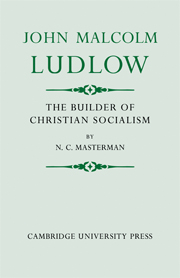Book contents
- Frontmatter
- Contents
- Acknowledgements
- INTRODUCTION
- I THE PARISIAN SCHOOLBOY
- II THE STRANGE YOUNG LAWYER
- III THE FRATERNAL CHRISTIAN
- IV FRENCH SOCIALISM FOR ENGLISH CHARTISTS
- V THE STATESMAN OF CO-OPERATION
- VI THE PRODUCER'S THEORETICIAN
- VII A PROPHET OUT-PROPHESIED?
- VIII REVIEWER AND EDUCATIONALIST
- IX THE DEMOCRATIC IMPERIALIST
- X THE MENTOR OF GERMANS
- XI LEGISLATOR AND CIVIL SERVANT
- XII THE CRITICAL UNIONIST
- Conclusion: LUDLOW'S ACHIEVEMENT
- Appendix: LUDLOW ON THE JUNTA
- Notes
- Bibliography
- Index
XI - LEGISLATOR AND CIVIL SERVANT
Published online by Cambridge University Press: 07 October 2011
- Frontmatter
- Contents
- Acknowledgements
- INTRODUCTION
- I THE PARISIAN SCHOOLBOY
- II THE STRANGE YOUNG LAWYER
- III THE FRATERNAL CHRISTIAN
- IV FRENCH SOCIALISM FOR ENGLISH CHARTISTS
- V THE STATESMAN OF CO-OPERATION
- VI THE PRODUCER'S THEORETICIAN
- VII A PROPHET OUT-PROPHESIED?
- VIII REVIEWER AND EDUCATIONALIST
- IX THE DEMOCRATIC IMPERIALIST
- X THE MENTOR OF GERMANS
- XI LEGISLATOR AND CIVIL SERVANT
- XII THE CRITICAL UNIONIST
- Conclusion: LUDLOW'S ACHIEVEMENT
- Appendix: LUDLOW ON THE JUNTA
- Notes
- Bibliography
- Index
Summary
All Ludlow's activities after 1870, described in the previous chapter, were subordinate to his work as secretary to the North-cote Commission on friendly societies.
Up till then he appears to have had little contact with these institutions, though since co-operators and trade unions registered in the friendly society office, he was familiar with certain aspects of friendly society law. There were in the eighteen-seventies friendly societies of varying ages and in all stages of development, from the primitive village club to the complex organisation of the great orders like the Oddfellows or Foresters, with their lodges and delegate meetings, their professionalised staff which brought the latest knowledge of a new actuarial science to the distant locality. These orders had been built up during the nineteenth century by men of immense moral authority who had evolved specialised skills of their own, requiring heroic labours. Thus Henry Ratcliffe, the corresponding secretary of the Manchester Unity, worked, it was said, sixteen or seventeen hours a day to produce reliable tables of sickness and mortality in various trades so that it was possible to deduce what subscriptions had to be paid to make the societies financially solvent. The pioneer investigations of such men in the friendly society movement were used by the creators of the Welfare State.
- Type
- Chapter
- Information
- John Malcolm LudlowThe Builder of Christian Socialism, pp. 217 - 236Publisher: Cambridge University PressPrint publication year: 1963



